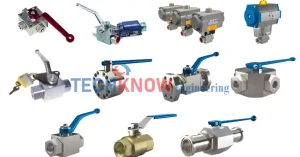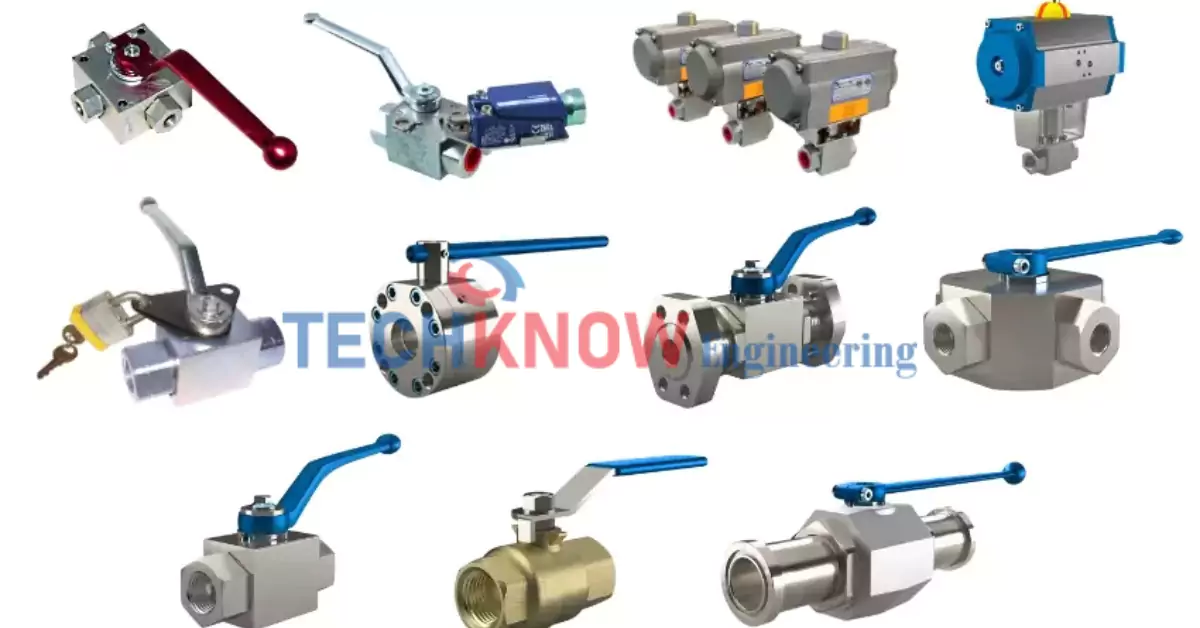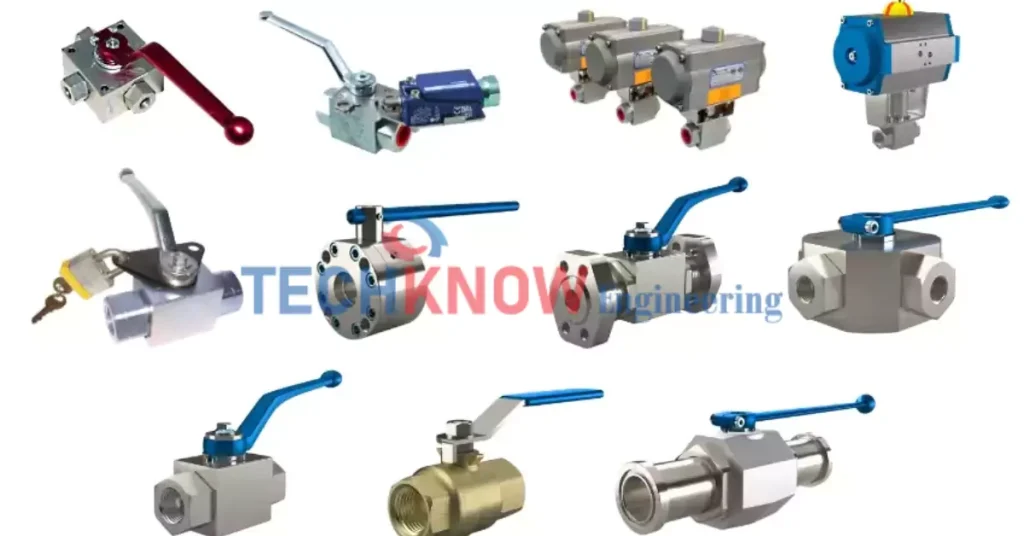What Are Valves and Their Types?
Valves are essential components in virtually every industrial system, controlling the flow of liquids, gases, and other materials with precision and reliability. From simple household plumbing to complex petrochemical plants, these mechanical devices ensure safe and efficient operation across countless applications.
Understanding the different types of valves and their specific functions is crucial for engineers, plant operators, and maintenance professionals. Each valve type serves distinct purposes, whether it’s stopping flow entirely, regulating pressure, or preventing dangerous backflow conditions.
Techknow Engineering Enterprise has been at the forefront of valve technology for years, supplying high-performance industrial valves to sectors ranging from oil and gas to water treatment. This comprehensive guide explores what valves are, examines the main types available, and explains how to select the right valve for your specific industrial needs.
What Is a Valve?
A valve is a mechanical device designed to control the flow and pressure of fluids—including liquids, gases, and slurries—through piping systems. By opening, closing, or partially obstructing flow paths, valves enable operators to manage industrial processes with precision and safety.
The basic anatomy of most valves includes several key components. The valve body houses the internal mechanisms and provides connection points to the pipeline. The actuator—whether manual, pneumatic, or electric—provides the force needed to operate the valve. The stem transmits motion from the actuator to the internal flow control element, whilst the disc or closure element actually stops or regulates the flow.
Different valve designs achieve flow control through various mechanisms. Some valves use a disc that moves perpendicular to the flow path, whilst others employ rotating elements or sliding gates. The choice of mechanism depends on factors such as the required flow characteristics, pressure ratings, and the nature of the fluid being controlled.
Modern industrial valves often incorporate sophisticated features such as position feedback, automated control systems, and materials engineered for extreme temperatures or corrosive environments. These advances have made valves more reliable and easier to integrate into complex process control systems.
Types of Valves and Their Uses
The valve industry offers numerous designs, each optimised for specific applications and operating conditions. Understanding these different valve types helps engineers select the most appropriate solution for their systems.
Gate Valve: Gate valves are among the most common valve types in industrial applications. They feature a wedge-shaped disc that moves perpendicular to the flow direction, providing either full flow or complete shut-off. When fully open, gate valves offer minimal pressure drop, making them ideal for applications where unrestricted flow is important.
These valves excel in on/off control applications but are not suitable for throttling or flow regulation. Gate valves work best with clean liquids and are commonly found in water distribution systems, oil pipelines, and steam applications. Their robust construction makes them suitable for high-pressure and high-temperature services.
Ball Valve: Ball valves use a spherical closure element with a bore through its centre. When the bore aligns with the pipeline, flow passes through unrestricted. A 90-degree rotation closes the valve completely, providing quick shut-off capability with minimal effort.
The tight sealing characteristics of ball valves make them excellent for applications requiring minimal leakage. They handle both liquids and gases effectively and can operate in high-pressure conditions. Ball valves are particularly popular in natural gas systems, chemical processing, and applications where rapid operation is essential.
Globe Valve: Globe valves feature a disc that moves parallel to the flow direction, making them excellent for throttling applications. The S-shaped flow path through the valve body provides good flow control characteristics, though it creates higher pressure drops compared to straight-through designs.
These valves offer precise flow regulation and are commonly used in steam systems, cooling water applications, and fuel oil systems. Globe valves can handle high-pressure conditions and provide excellent shut-off capabilities when fully closed.
Butterfly Valve: Butterfly valves use a disc that rotates around a central axis to control flow. Their compact design and lightweight construction make them economical choices for large-diameter pipelines. The disc remains in the flow path even when fully open, creating some pressure drop but offering good flow characteristics.
These valves are popular in HVAC systems, water treatment plants, and applications requiring frequent operation. Butterfly valves can handle large volumes of flow whilst maintaining relatively low operating torque requirements.
Check Valve: Check valves prevent backflow by automatically closing when flow reverses direction. They operate without external power or control signals, relying on the fluid’s momentum to maintain the correct position. Common designs include swing check, lift check, and ball check valves.
These valves are essential safety devices in pump discharge lines, boiler feed systems, and any application where backflow could cause equipment damage or process disruption. Check valves help maintain system pressure and protect upstream equipment.
Plug Valve: Plug valves use a cylindrical or conical plug with a bore through its centre. Rotating the plug aligns or misaligns the bore with the pipeline, controlling flow. These valves offer excellent shut-off characteristics and can handle corrosive or abrasive fluids.
Plug valves are commonly used in petroleum refining, chemical processing, and applications involving corrosive materials. Their simple design makes them reliable in harsh operating conditions.
Control Valve: Control valves automatically regulate flow, pressure, or temperature based on signals from process control systems. They typically include an actuator, positioner, and sophisticated trim designs optimised for specific control functions.
These valves are essential components in automated process control systems, enabling precise regulation of industrial processes. Control valves are found in virtually every process industry, from pharmaceuticals to power generation.
How to Choose the Right Valve
Selecting the appropriate valve requires careful consideration of multiple factors that affect performance, reliability, and cost-effectiveness. Understanding these selection criteria helps ensure optimal system performance and longevity.
Operating conditions play a crucial role in valve selection. Pressure and temperature ratings must exceed the maximum conditions the valve will encounter, including any potential transient conditions. The chemical compatibility between the valve materials and the process fluid is essential to prevent corrosion or degradation.
Flow characteristics determine how the valve will perform in the specific application. On/off applications require valves with good shut-off characteristics, whilst throttling applications need valves with predictable flow control curves. The required flow coefficient (Cv) helps determine the appropriate valve size.
Installation and maintenance considerations affect long-term operating costs. Some valve types require more frequent maintenance or have higher replacement costs. Accessibility for maintenance and the availability of spare parts should influence the selection process.
Techknow Engineering Enterprise’s technical team provides comprehensive support in valve selection, helping clients evaluate these factors and choose the most suitable valve for their specific requirements. Their expertise covers the complete range of industrial applications and operating conditions.
Applications of Industrial Valves
Industrial valves find applications across numerous sectors, each with specific requirements and operating challenges. Understanding these applications helps illustrate the critical role valves play in modern industrial systems.
The oil and gas industry relies heavily on valves for exploration, production, refining, and distribution operations. High-pressure gate valves control flow in pipelines, whilst specialised ball valves handle corrosive fluids in refineries. Safety systems incorporate emergency shut-off valves to protect against hazardous releases.
Water treatment facilities use various valve types to manage the treatment process. Butterfly valves control flow in large water mains, whilst control valves regulate chemical dosing systems. Check valves prevent contamination by ensuring flow moves in the correct direction.
Pharmaceutical manufacturing requires valves that meet strict hygiene and regulatory standards. Sanitary valve designs prevent contamination whilst maintaining the precise control necessary for pharmaceutical processes. Materials must be compatible with cleaning and sterilisation procedures.
Manufacturing industries use valves in cooling systems, compressed air networks, and process control applications. HVAC systems rely on control valves to maintain comfortable conditions whilst minimising energy consumption. Steam systems use specialised valves designed to handle high-temperature conditions.
Power generation facilities depend on valves for boiler feed systems, cooling water circuits, and fuel handling systems. The reliability of these valves directly affects plant availability and safety. High-performance materials and designs are essential for these demanding applications.
Why Choose Techknow Engineering Enterprise?
Techknow Engineering Enterprise has established itself as a trusted supplier of high-performance industrial valves through decades of experience and commitment to quality. Their comprehensive product range covers all major valve types, from standard industrial applications to specialised custom solutions.
Quality assurance is central to Techknow Engineering Enterprise’s approach. All valves undergo rigorous testing to ensure they meet or exceed industry standards. Relevant certifications demonstrate compliance with international quality and safety requirements, giving customers confidence in their valve investments.
Technical expertise sets Techknow Engineering Enterprise apart from competitors. Their engineers understand the complexities of valve selection and can provide guidance on the most appropriate solutions for specific applications. This support extends from initial specification through installation and ongoing maintenance.
The company’s commitment to customer service ensures that clients receive prompt support when needed. Technical queries are handled by experienced professionals who understand both the products and the applications. This support helps minimise downtime and ensures optimal system performance.
Techknow Engineering Enterprise also offers custom valve solutions for unique applications that standard products cannot address. Their engineering capabilities enable the development of specialised valves that meet exact customer requirements whilst maintaining the quality and reliability expected from their standard product range.
Ensuring Optimal System Performance
Proper valve selection and installation are crucial for achieving reliable, efficient industrial operations. Understanding the characteristics and applications of different valve types enables better decision-making and improved system performance.
Regular maintenance and proper operating procedures extend valve life and ensure continued reliability. Working with experienced suppliers like Techknow Engineering Enterprise provides access to the expertise and support necessary for successful valve applications.
Need reliable valves for your industrial systems? Contact Techknow Engineering Enterprise today for expert guidance and premium-quality valve solutions tailored to your specific requirements.
Valve

Learn about industrial valves, their types, and applications. From ball valves to control valves, discover the right solution for your system needs.
Product Brand: Techknow Engineering Enterprise
Product Currency: INR
Product In-Stock: InStock
5


